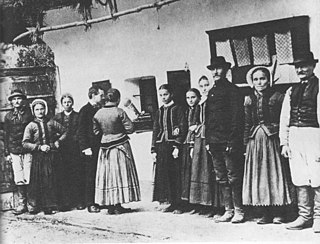
Throughout its history, the United Kingdom has been a major producer and source of musical creation, drawing its artistic basis from the history of the United Kingdom, from church music, Western culture and the ancient and traditional folk music and instrumentation of England, Scotland, Northern Ireland and Wales.
The music of the Lesser Antilles encompasses the music of this chain of small islands making up the eastern and southern portion of the West Indies. Lesser Antillean music is part of the broader category of Caribbean music; much of the folk and popular music is also a part of the Afro-American musical complex, being a mixture of African, European and indigenous American elements. The Lesser Antilles' musical cultures are largely based on the music of African slaves brought by European traders and colonizers. The African musical elements are a hybrid of instruments and styles from numerous West African tribes, while the European slaveholders added their own musics into the mix, as did immigrants from India. In many ways, the Lesser Antilles can be musically divided based on which nation colonized them.
The music of Saint Lucia is home to many vibrant oral and folk traditions and is based on elements derived from the music of Africa, especially rhythmically, and Western Europe, dances like the quadrille, polka and waltz. The banjo and cuatro are iconic Lucian folk instruments, especially a four-stringed banjo called the bwa poye. Celebratory songs called jwé show lyricism, and rhythmic complexity. The most important of the Afro-Lucian Creole folk dances is the kwadril. Music is an integral part of Lucian folk holidays and celebrations, as well as the good-natured rivalry between the La Rose and La Marguerite societies. There is little Western classical music on Saint Lucia, and the country's popular music industry is only nascent. There are few recording opportunities, though live music and radio remain a vital part of Lucian culture. Popular music from abroad, especially Trinidadian styles like calypso and soca, is widespread.

Helenite, also known as Mount St. Helens obsidian, emerald obsidianite, and ruby obsidianite, is an artificial glass made from the fused volcanic rock dust from Mount St. Helens and marketed as a gemstone. Helenite was first created accidentally after the eruption of Mount St. Helens in 1980. Workers from the Weyerhaeuser Timber Company were attempting to salvage equipment damaged after the volcanic eruption. Using acetylene torches, they noticed that the intense heat was melting the nearby volcanic ash and rock and turning it a greenish color. The silica, aluminium, iron, and trace amounts of chromium and copper present in the rocks and ash in the area, combined with the heat of the torches, transformed the volcanic particles into a compound that would be later commercially replicated as helenite.
The Culture of Saint Lucia blends the influences of African, French, and English heritage. The official language of the island is English but Kreole, a form of French patois, remains an influential secondary language. The people are predominantly Catholic but the religious climate is tolerant.
Joyce Auguste was a Saint Lucian musician and leader of The Hewanorra Voices, which became a major popular folk band in the 1970s. Auguste also worked as music supervisor for the Saint Lucian school system and introduced folk music into the school curriculum.

Dame Marie Selipha Descartes, DBE, BEM, best known as Sesenne, was a Saint Lucian singer and cultural icon. Singing in her native patois language, at a time when authorities barred its use, Sesenne developed a wide following in the rural area in which she grew up. Patronage by St. Lucia's first woman legislator led to the singer's "discovery" by a cultural preservationist, who in turn introduced Sesenne to an American anthropologist to make recordings of her songs.
The U.S. Virgin Islands Premier League is the top soccer club competitions running in U.S. Virgin Islands.
The Hewanorra Voices were a Lucian folk music ensemble, led by Joyce Auguste. They emerged in the 1970s, and were one of the premier groups of the Lucian roots revival, along with The Helenites. Their recordings include 1974's St. Lucia Jems and 1980's All Year Round With The Hewanorra Voices, both released by West Indies Records..
Isidore Philip Tisson was an international footballer from Saint Lucia. Tisson played as a midfielder, and played club football for clubs throughout the Caribbean including Canaries, Anse La Raye Young Stars and Helenites.

Lúcia de Jesus Rosa dos Santos, O.C.D., also known as Lúcia of Fátima and by her religious name Sister Maria Lúcia of Jesus and of the Immaculate Heart, was a Portuguese Catholic O.C.D. nun and one of the three children, including her cousins, Francisco and Jacinta Marto, who claimed to have witnessed Marian apparitions in Fátima in 1917.

Helenites SC is a U.S. Virgin Islands soccer club based in Grove Place, U.S. Virgin Islands that regularly competes in the U.S. Virgin Islands Championship, and has had success in the tournament. The team competes in the St Croix Soccer League and is one of the most successful clubs in St Croix and in the U.S. Virgin Islands.
The St. Croix Soccer League is a regional soccer championship played in Saint Croix, United States Virgin Islands. The two best teams of the championship qualifies to US Virgin Islands Championship.
In the 2014–15 football season, the U.S. Virgin Islands Championship was won by Helenites SC of the St. Croix Soccer League, beating Raymix SC of the St. Thomas League in the final.
The 2016–17 U.S. Virgin Islands Championship was the 14th edition of the competition. The season began on 30 October 2016 and ended on 12 February 2017. The championship itself was a four-team tournament that determined the domestic champion of the U.S. Virgin Islands, based on the top two finishers in the St. Croix and St. Thomas Leagues.






